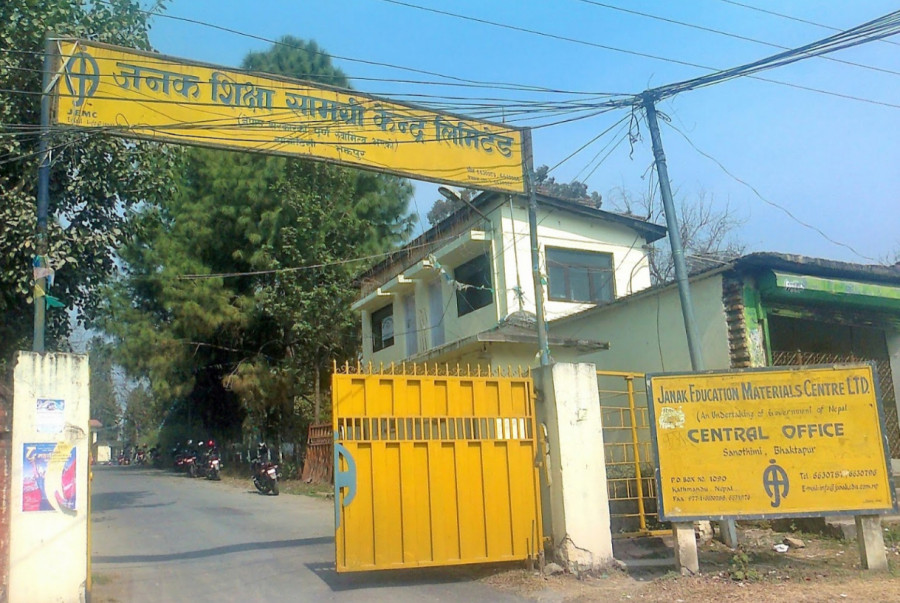Money
Government press for textbooks to print nearly 100 million excise duty stickers
Inland Revenue Department forced to seek domestic solution as an emergency measure since it has run out of important stickers with Indonesian company selected to print them not showing up and Lithuanian company’s claim in court.
Prithvi Man Shrestha
With the Inland Revenue Department facing acute shortage of excise duty stickers in the recent months, the tax authority has asked the Janak Education Material Centre to print nearly 100 million stickers.
It is the first time that the tax authority authorised domestic printing presses to print the excise duty stickers in more than two decades. In the late 1990s too it had printed stickers for the tax authority. But, in order to ensure high security features, the department has been getting supply of stickers from abroad ever since.
“We have ordered printing 96.9 million pieces of excise duty stickers to Janak Education Material Centre,” said Gajendra Thakur, deputy director general at the department. “We have ordered printing three types of stickers for cigarettes and chewing tobacco.”
He said that the state owned printing body is expected to start supplying the printed stickers in one and half months. The department is spending around Rs110 million to get these stickers printed from Janak Education Material Centre.
Tax officials were forced to seek alternatives after Perusahaan Umum Percetakan Uang Republik Indonesia (Perum Peruri), selected to supply the stickers in March, didn’t show up to sign a contract with the department.
The centre usually prints text books for government schools. It had also printed ballot papers for the federal, provincial and local elections in 2017.
The tax authority was forced to print the stickers at domestic printing presses as an emergency measure given that it is running out of stickers for liquors and tobacco one by one but it takes several months to procure the stickers calling a fresh international tender.
As per the law, such stickers must be pasted to sell the liquor and tobacco products in the market. But, the tax authority said it is now running out of 4 or 5 types of stickers for tobacco and liquor. “There are no stickers for the imported liquors. We also don’t have 2 or 3 types of stickers for cigarettes,” said Shivadevi Dahal, another deputy director-general at the department. “We will soon run out of stickers for gutkha (chewing tobacco) too.”
An official at the Janak Education Material Centre said that the printing body has been making preparations to print the stickers. “We signed an agreement with the supplier of the papers for the stickers on Friday last week,” said Chitra Acharya, spokesperson at the Janak Education Material Centre. “We have also called tender for some small machines required to print the stickers.”
According to the centre, it aims to print the sticker with an acceptable level of security features based on whatever equipment and materials it has available. “We cannot ensure all the security features that existed with the stickers printed abroad,” said Acharya.
Although the tax authority had also planned to get the stickers printed from the Department of Printing too the printing department could not ensure the minimum security features for the excise stickers, according to Thakur.
“The printing department also showed no interest to procure required machines to print the stickers and we are getting the stickers printed only from Janak,” he said.
Had the tax authority not faced a legal challenge for its bidding process in late 2019, it would have got the supply of stickers by now, according to officials at the tax authority. Its procurement process was delayed after the Supreme Court in November issued a stay order on the deal in response to a writ petition arguing that the domestic printers were not allowed to take part in the bidding process.
But on February 24, this year, the court allowed the tax authority to resuscitate plans to buy such stickers by vacating the earlier interim order, giving a sigh of relief to the officials of the tax authority.
After the clearance from the court, the Perum Peruri, the lowest evaluated bidder, was selected to print and supply stickers and invited for signing the contract. But, the Indonesian company refused to come to sign the contract.
Although the department could have awarded the contract to the second lowest bidder, a Lithuanian company, the department refused to do so, citing some technical issues.
The Lithunian company then moved the Supreme Court citing section 27(6) of the Public Procurement Act, which says contracts should be awarded to the second-ranked bidder if the first-ranked bidder refuses to sign the deal.
This created further problems for the department to issue a fresh tender. Although the Supreme Court didn’t issue an interim order as sought by the Lithuanian company, the case is still pending. So, officials at the tax authority said they could not call fresh international tender too as long as a court case is pending.
This is also one of the reasons why the department seeks to print the stickers at a government-owned press. “The situation with stickers is worsening. We could manage with limited stickers because economic activities have now plunged due to lockdown and restrictive measures,” said Dahal.




 9.7°C Kathmandu
9.7°C Kathmandu















